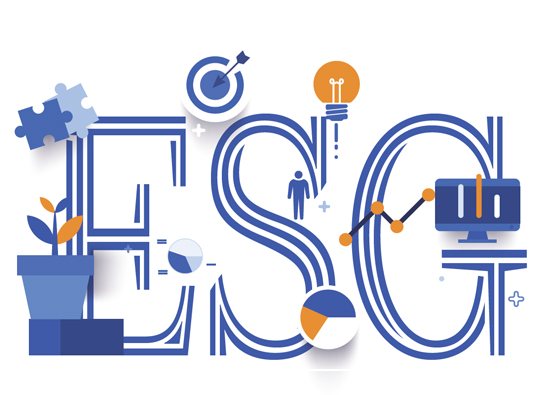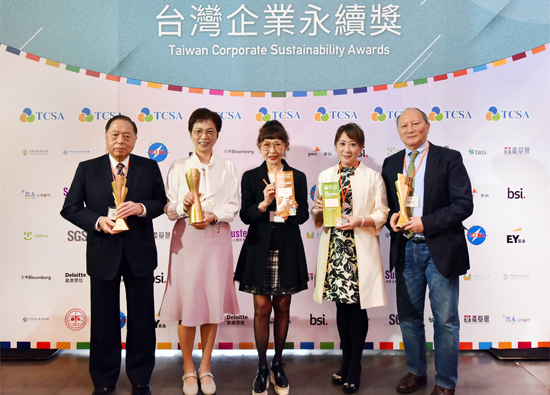01.2022 Cover Story
Control the new wave of ESG and accelerate the expansion of enterprise sustainable influence
Zicheng sustainability development service company / Lin Jingen Deputy President



The 26th United Nations Climate Change Summit (cop26) just ended in Glasgow, UK, at the end of November. Despite the continuous protests outside the venue and the lack of specific consensus on on-site resolutions, it still highlights the sustainable trend of ESG, which has become the standard equipment for countries and enterprises in competitiveness and even viability!
Net zero survival war enterprises must accelerate to master the carbon governance strategy
Looking forward to 2022, in the tide of governments and large enterprises shouting net zero and the world working together to fight for net zero emissions in 2050, carbon pricing has become one of the most important tools for Climate Governance in various countries. Carbon governance is also related to the survival of enterprises. Whether active or passive, Taiwan enterprises must respond and keep up.
The EU has thrown out a shock bomb and took the lead in proposing the carbon border adjustment mechanism (CBAM). It is expected to start the transition period in 2023 to collect carbon emission information of imported products and officially implement it in 2026. It requires importers of five major industrial commodities: cement, steel, aluminum, fertilizer and electricity, The purchase certificate is based on the embedded emission of the product to reflect the carbon cost of the product. If the carbon fee has been paid in the exporting country, it can be deducted.
In order to prevent the flow of carbon fees to the EU, countries have taken action one after another. Facing the pressure of climate change and carbon reduction, the Taiwan government has revised relevant policies and regulations. In addition to the criteria for items to be recorded in the annual report and corporate governance 3.0, it also announced in October that the "greenhouse gas reduction and management law" was amended as the "climate change response law", and the goal of "2050 net zero emission" was incorporated into the law, Raise issues such as levying carbon fees on domestic emission sources and imported products with high carbon content.
Taiwan's industrial structure is dominated by export trade. In order to maintain competitiveness, enterprises must face the issue of carbon price as soon as possible and master four key countermeasures:
1. Implement carbon inventory and monitor the change of carbon emission trend, and strengthen the value chain emission management.
2. Conduct risk assessment and financial quantification to simulate the financial impact of carbon price on enterprises under different transformation scenarios.
3. Set science based targets (SBT) and specify the path of carbon reduction methods.
4. According to TCFD's suggestions, we can also evaluate and introduce the internal carbon pricing system to improve the effective carbon governance system.
When extreme climate has become the new normal, enterprises must recognize that carbon reduction alone is not enough and must move towards zero carbon; From self required operational emission reduction, it extends to the emission reduction of the whole value supply chain. Moreover, before weight loss, you must measure your weight before you can formulate goals and plans. If it is not enough to only count the overall carbon emissions, you must "finance" the carbon and actually convert it into financial costs, so as to truthfully show the impact and impact on finance; At the same time, we should also be meticulous and calculate the carbon emissions of commodities in order to respond to the carbon fee mechanism to be launched by various countries.
The re evolution of social co prosperity will deeply connect the enterprise brand value and influence
It is noteworthy that, in addition to the "e" (Environmental Governance) issue, "s", which represents social prosperity and social engagement, will also jump into the sustainable mainstream and affect the brand value and influence of enterprises.
Greenbiz, an international well-known media organization, and trust, a subsidiary of S & P global, compiled and compiled the environmental performance data of organizations in the S & P 500 index and S & P global 1200 index, and jointly released the 2021 state of green business report in combination with the information of 15000 enterprises covered in the trust database, One of the top 10 sustainability development trends in 2021 is that "s" (social participation) becomes a sustainable mainstream.
In the past, in the process of implementing ESG, both "g" (Corporate Governance) and "e" (environmental sustainability) have corresponding laws and regulations, standards and certification to follow. However, the "s", which represents the direction of social participation, is difficult to be quantified and evaluated because its benefits are intangible. Most of them play a supporting role in ESG, and most enterprises also prefer the investment of traditional public welfare and charitable donations.
According to the 2021 global and Taiwan family business survey report released by Zicheng, 59% of Taiwan family businesses implement social responsibility by traditional charitable donations, and 35% undertake social responsibility by giving back to the countryside and running charities. However, the covid-19 epidemic reversed the priority of enterprises in ESG and greatly increased the importance of "s" (social participation). The outside world re examines the health care, gender equality, human rights and other issues of enterprises for workers in the organization. At the same time, more and more research reports and surveys have found that when the epidemic makes the market reshuffle, whether enterprises' daily investment in social performance and community relations are in-depth and stable can greatly mitigate the brand impact when risks occur.
However, "s" is also the most easily blank and brain burning pain point for enterprises. How to start from the core industry and cut into relevant social issues is testing the creativity and execution of sustainable departments. The display of enterprises' social power depends on the strength of "sustainable brand communication". Take Nestle coffee as an example. In 2015, consumers boycotted it on the Internet because of the origin of coffee and chocolate, child labor, human rights problems, and the lack of recycling mechanism for the aluminum shell of capsule coffee, resulting in a sharp drop in turnover. Nestle coffee communicated in real time and called out the "the positive Cup" plan. It promised to take care of the rights and interests of farmers and workers in coffee producing areas, put forward a global coffee capsule recycling mechanism and the recycling of coffee grounds. At the same time, it launched various activities and film publicity Online and offline simultaneously, so as to stop the decline and recovery of coffee capsule turnover. These projects have also been implemented in Taiwan. Taiwan Nestle and Chunghwa Post have carried out actions such as the mechanism of free recycling of coffee aluminum shell capsules in 2000 sites and the cooperative application of coffee grounds with the Agricultural College of National Taiwan University.
The last mile of sustainable brand communication accumulates brand resilience and social influence for enterprises
Since the investment of "s" can turn the enterprise crisis into a turning point and accumulate sustainable resilience and capital for the brand, Zicheng sustainability development's unique "sustainable brand communication" team in Taiwan's sustainable field provides sustainable brand communication strategies, external communication and internal communication services with the help of talents from the media, marketing and public relations fields, Assist enterprises to redefine brand vision & mission from the perspective of sustainability, start from the core business, cut into the topics of social participation, expand the voice in the field of sustainability, establish sustainable brand value and win the influence of sustainable brand.
Different from traditional public relations, sustainable brand communication takes "sustainability" as the starting point. First, set the brand strategy, and then match appropriate communication channels and methods for different stakeholders. At the same time, through innovative modes such as speeches, design thinking and sustainable board games, implement enterprise internal communication and deeply plant sustainable DNA in the organization. Sustainable brand communication can accurately show the sustainable performance of the enterprise, highlight the brand value and social influence, and help the enterprise not only promise the charity recognized by the general public, but also effectively respond to the expectations of stakeholders from all walks of life.
Taking the "Zicheng sustainable influence Award" jointly organized by Zicheng sustainability and the official representatives of Cannes Lions International Festival of creativity in Taiwan as an example, the award takes "making good use of story power and creating influence" as the core concept to encourage organizations to display image creativity and show how to solve sustainable issues and then produce positive influence, And respond to sdgs. Each year's award-winning works are the epitome of Taiwan enterprises solving diversified social issues with sustainable creativity. This year, entering the fifth session, in addition to the original "enterprise sustainability group", a "social innovation group" is added. Government departments, colleges and universities, non-profit organizations, social enterprises and local creative teams are invited to participate.
This year's sustainable influence award won the gold awards of "enterprise sustainability group" and "social innovation group" respectively by Carrefour "change, start from seeing animals" and Ruoshui international "technology for good to create a new possibility for employment with disabilities. In addition, 18 works were affirmed by the jury, and the winning units span the public and private sectors. Among them, Carrefour and the Taiwan Animal Society Research Association established the "animal welfare logo" and launched the "transparent milk", urging people to choose farm consumption friendly to the dairy environment, pay attention to animal welfare, respond to sdg12 responsible production and consumption, and communicate with consumers through their own channels. As for the silver prize, it was won by Taipei Fubon Bank's "love, sound on the ground" and the "PChome green shopping plan" of online home international information, both of which gave play to social influence by optimizing their core business. The former cooperates with Taiwan Sign Language Translation Association to promote sign language education and training for practitioners and improve service inclusiveness; The latter focuses on promoting green consumption, reducing and reusing packaging through online shopping, effectively reducing the impact of packaging materials on the environment, and is expected to drive more responses from e-commerce peers.
In order to implement ESG, Taiwan enterprises have established a mechanism within the organization, carried out various measurements and evaluations, and stepped into the stage of external disclosure and communication, so as to shape a sustainable corporate culture. How to focus on the core industry to invest in social participation, promote sustainability strategies, build operational resilience and sustainability, and make good use of new media to expand influence will be the last key to the success of enterprises!
Welcome to join Zicheng members and subscribe to [sustainability news] to receive first-hand sustainability trends.
For the list of winners and films of the 5th Zicheng sustainable influence award, please refer to: https://csrone.com/topics/7158
#


















